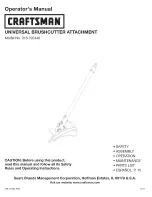
8
Safety
DBH Safety Rules (10/4/2016)
Remove accumulated debris from this equip
-
ment, power unit, and engine to avoid fire hazard.
Make sure all safety decals are installed.
Replace if damaged. (See Safety Decals section for
location.)
Make sure shields and guards are properly
installed and in good condition. Replace if dam
-
aged.
Do not put this equipment into service unless all
side skids are properly installed and in good condi
-
tion. Replace if damaged.
A minimum 20% of tractor and equipment
weight must be on the tractor front wheels when
attachments are in transport position. Without this
weight, front tractor wheels could raise up result
-
ing in loss of steering. The weight may be attained
with front wheel weights, ballast in tires, front trac
-
tor weights or front loader. Weigh the tractor and
equipment. Do not estimate.
Inspect and clear area of stones, branches, or
other hard objects that might be thrown, causing
injury or damage.
Connect PTO driveline directly to power unit
PTO shaft. Never use adapter sleeves or adapter
shafts. Adapters can cause driveline failures due to
incorrect spline or incorrect operating length and
can result in personal injury or death.
TRANSPORTATION
Power unit must be equipped with ROPS or
ROPS cab and seat belt. Keep seat belt securely
fastened. Falling off power unit can result in death
from being run over or crushed. Keep foldable
ROPS system in “locked up” position at all times.
Before transporting, stop tractor PTO, raise cut
-
ter center section, then raise cutter head, and
install transport bar. A raised cutter head can fall
and crush. Keep away; never go underneath. Lower
cutter head after transport and for storage.
Always comply with all state and local lighting
and marking requirements.
Never allow riders on power unit or attachment.
Do not operate PTO during transport.
Do not operate or transport on steep slopes.
Do not operate or transport equipment while
under the influence of alcohol or drugs.
Use additional caution and reduce speed when
under adverse surface conditions, turning, or on
inclines.
OPERATION
Do not allow bystanders in the area when oper
-
ating, attaching, removing, assembling, or servic
-
ing equipment.
Never walk, stand, or place yourself or others
under a raised wing or in the path of a lowering
wing. Hydraulic system leak-down, hydraulic sys
-
tem failures, mechanical failures, or movement of
control levers can cause wings to drop unexpect
-
edly and cause severe injury or death.
Full chain shielding must be installed at all
times. Thrown objects could injure people or dam
-
age property.
• If the machine is not equipped with full chain
shielding, operation must be stopped.
• This shielding is designed to reduce the risk
of thrown objects. The mower deck and protec
-
tive devices cannot prevent all objects from
escaping the blade enclosure in every mowing
condition. It is possible for objects to ricochet
and escape, traveling as much as 300 feet
(92m).
Never direct discharge toward people, animals,
or property.
Do not operate or transport equipment while
under the influence of alcohol or drugs.
Operate only in daylight or good artificial light.
Keep hands, feet, hair, and clothing away from
equipment while engine is running. Stay clear of all
moving parts.
Never allow riders on power unit or attachment.
Power unit must be equipped with ROPS or
ROPS cab and seat belt. Keep seat belt securely
fastened. Falling off power unit can result in death
from being run over or crushed. Keep foldable
ROPS system in “locked up” position at all times.
Always sit in power unit seat when operating
controls or starting engine. Securely fasten seat
belt, place transmission in neutral, engage brake,
and ensure all other controls are disengaged
before starting power unit engine.
Operate tractor PTO at 540 RPM (1000 RPM on Q
Series cutters). Do not exceed.
Raise or lower wings slowly to prevent personal
injury or damage to cutter.
SAFETY RULES
ATTENTION! BECOME ALERT! YOUR SAFETY IS INVOLVED!









































